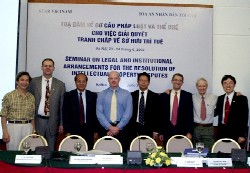You are here » Home » Telling Our Story
Case Study
New Civil Procedures Code moves Vietnam toward a more impartial judicial system
Fairer Courts Make Fairer Decisions

| |
Photo: STAR
|
|
International experts trained judges on implementing the Civil Procedures Code.
The code enables judges to order the seizure counterfeit goods and requires that parties and their lawyers are treated equally and their rights protected.
|
Challenge
A well-functioning, independent and impartial court system is vital to resolving
commercial disputes, advancing economic development and establishing the rule of law.
In Vietnam, outdated civil procedure rules not only kept the courts from resolving
disputes effectively, but they also conflicted with intellectual property rights
requirements of the U.S.-Vietnam Bilateral Trade Agreement and the World Trade Organization.
In addition, under Vietnam's "inquisitorial" system of dispute resolution, the judge
gathered evidence and could arbitrarily decide whether a party could speak or present
evidence. Fair resolution of disputes was difficult, if not impossible, and the
participation of a state prosecutor in almost all stages of civil cases injected a
high decree of uncertainty.
Initiative
USAID has helped the Supreme People's Court and the National Assembly develop and enact a new Civil Procedures Code to guide the day-to-day work of courts and judges. USAID provided detailed comments on drafts and background papers on key issues, organized retreats to prepare the final draft, and worked directly with the National Assembly's Law Committee to finalize the draft. In June 2004, the Assembly passed the landmark Civil Procedures Code. Currently, USAID is supporting the training of almost 500 judges on how to implement the code.
Results
The innovations of the new Civil Procedures Code take the Vietnamese judicial system further toward cementing the rule of law and bring the country closer to complying with the Bilateral Trade Agreement and World Trade Organization. The code now enables judges to order the seizure of counterfeit goods, eliminates the state prosecutor from civil cases, requires that court decisions be based only on evidence admitted at trial, and requires that parties and their lawyers are treated equally and their rights protected. The groundbreaking Civil Procedures Code has moved Vietnam dramatically away from a judge-led system of civil dispute resolution and toward an adversarial system that specifically recognizes party initiative.
Print-friendly version of this page (40kb - PDF)
Click here for high-res photo
Back to Top ^ | 

